
Being good at answering job interview questions is not the same as being good at your job. It is important to take job interview questions seriously, though. If you do not answer interview questions well, you will not get a chance to show your employer your skills and professionalism.
Tact and politeness are important skills for a wide variety of jobs. You must choose wisely when to speak up and when to go with the flow, no matter your professional field. Antagonizing your coworkers is always bad, but some jobs require you to initiate potentially conflict-prone conversations more than others. Therefore, your potential employer will probably ask you some conflict resolution interview questions. How well you answer them can affect your prospects of getting hired.
Why Do Employers Ask Conflict Resolution Interview Questions?
Employers ask interview questions regarding conflict for several reasons. If human resources employees got a penny every time they saw the phrase “excellent communication skills” on a resume, human resources would be the world’s most lucrative profession.
Part of the reason that interviewers ask about conflict resolution is just to test your communication skills. If you can answer a question concisely without rambling, then you will be effective at communicating with customers and coworkers. Communication skills like these are especially important in leadership and customer support jobs.
More importantly, interviewers care about conflict resolution because conflict at work is almost inevitable. They might be able to find out how you handle conflict by contacting your references. You are the most important source of information about your effective conflict resolution experiences, though. Interviewers want to see that you are thoughtful when it comes to past and future workplace conflicts by exercising your conflict management skills.
Common Conflict Resolution Interview Questions
1. What Is Your Conflict Resolution Style?
Your answer to this question should reflect an awareness that there are multiple approaches to conflict resolution. For example, you can refer to the five modes to manage conflict resolution, which are accommodating, avoiding, competing, compromising, and collaborating. You should answer honestly about which of these modes of effective conflict resolution comes most naturally to you. Being naturally competitive is not a character flaw, and neither is being naturally conflict-avoidant. Recognizing stable traits of your personality shows that you are a reflective person. Such emotional maturity or emotional intelligence bodes well for your professionalism.
No matter your natural style, you should acknowledge that different modes of conflict resolution are appropriate in different situations. Give an example of a time when you resolved a conflict using methods other than the ones that come most naturally to you. For example, maybe your instinct is to avoid conflict, but you once resolved a conflict by taking the initiative to negotiate with the other party.
2. How Did You Resolve a Conflict When Working as a Team?
Anyone can memorize platitudes to recite in response to interview questions related to conflict resolution. The best way to persuade the interviewer of your conflict resolution skills is to give specific examples. Preferably, these examples should come from your past work experiences, even if the interviewer does not directly phrase the question this way.
If your job requires you to work closely with a small group of coworkers, the interviewer will probably ask you about a conflict you resolved while working as a team by checking your problem solving skills.
In your answer, you should present yourself as the protagonist of the story and highlight your role in resolving the conflict. You should also describe the conflict and its resolution in a neutral and unbiased way. Do not make it sound like you were right and everyone else was wrong. Giving other people credit for their contributions is an important professional skill, no matter your professional field, otherwise, it will look like you have poor conflict management skills.
3. How Did You Resolve a Conflict With Your Manager or Supervisor?
Everyone who has worked in sales or customer support knows that “the customer is always right.” Resolving conflicts with the presumption that the other person is right also applies to other situations you might encounter at work.
For example, few workplaces are so authoritarian that employees are not allowed to challenge their supervisors or the company’s leaders. Organizations like these tend to have high employee turnover rates and to receive complaints about employer retaliation.
Despite this, disagreeing with your boss requires a different set of conflict resolution skills. Depending on your boss, it can be more challenging than resolving a conflict with a coworker or customer.
Start by describing your former manager’s conflict resolution style. Then describe the conflict objectively, as you did when describing a conflict with a coworker. If applicable, talk about how your approach to the conflict with your manager was different from your approach to other conflicts you encountered at the same job.
4. What Do You Do When You Disagree With Your Employer’s Rules or Policies?
Situations where you disagree with policies or rules you must follow show a lot about your character. For example, your willingness to follow a rule that you would not impose if you were the boss shows your ability to choose your battles. For example, as a summer camp counselor, the camp’s rules might have included more junk food and cheekier campfire songs than you would allow for your own children.
If you challenged a policy of your former employer, simply tell the story objectively and in detail. Most likely, it required you to use more than one conflict resolution strategy. If you previously quit a job because of policies you did not agree with, then tell this story in detail. If possible, choose an instance where you believed that you were acting in the best interest of the company or its customers or beneficiaries.
5. How Do You Respond to Negative Feedback?
Even in the most peaceful work environments, companies periodically conduct performance reviews on their employees. Getting negative criticism from your work supervisors is stressful, especially if you have put a lot of effort into your work.
Some conflict resolution interview questions may relate to a specific time when a former employer gave you a negative performance review or negative feedback, but you can create a positive work environment and achieve success by effectively addressing conflicts through active listening and demonstrating strong problem-solving skills.
If possible, give an example of your response to fair criticism and to unfair criticism. For example, maybe you were late to work multiple times one year, but it is because you were also a full-time student then. Acknowledge that you were late, but tell the interviewer that you were doing the best you could in your situation. Contrast this with a time that you received unfair criticism. Mention the evidence you provided to show that the criticism was unfair.

6. How Do You Respond to Complaints From Employees?
If you are interviewing for a managerial position, you will probably have to answer conflict management interview questions specific to managerial roles. Any conflict that relates to an employee you supervise is your responsibility to resolve. Answer honestly about a complaint you received from an employee in a previous managerial job you had.
The best way to respond to the complaint will depend on your workplace and on the nature of the complaint. Your answer should reflect knowledge of employment laws and conflict resolution skills.
For example, if the employee was complaining about safety violations, financial misconduct, or discrimination, you should demonstrate that you did not retaliate against your employee. If the work environment was rife with situations that would cause employees to complain, then your story about the complaints you received could explain why you left the job.
The Wrong Way to Respond to Conflict Resolution Interview Questions
Don’t stress yourself out trying to find the perfect conflict in your past. No interviewer will see it as a negative that your employment history has not been more conflict-prone. If you have not been involved in many conflicts, this could mean that you are generally easy to work with. Despite this, there are some “don’ts” when it comes to answering conflict management interview questions on the job.
For example, you should not give vague answers that sound like you memorized them during a career counseling session. Do not talk on and on about a minor conflict or make it sound like you escalated a conflict that you could have resolved easily. Most importantly, do not bad-mouth other team members or make it sound like you are holding a grudge about conflicts that happened long ago.
It Is Never Too Late to Improve Your Conflict Resolution Skills
If your lack of conflict management skills are causing you trouble at work, it can’t hurt to sharpen them up. Getting better at managing conflicts can make life easier for you at your current job by using open and respectful communication. It can also help you answer conflict-resolution interview questions when you look for a new job.
The best way to start is to take conflict resolution training classes with AllWin Conflict Resolution Training. AllWin offers coaching, workshops, and training courses on an individual and group basis. Whether you are a manager or a team member, AllWin has an in-person or online course that will help you resolve conflict at your current job and at future jobs.
Contact AllWin Conflict Resolution Training to Ace Your Next Interview
Customized conflict resolution training is just a few clicks away. Contact AllWin Conflict Resolution Training to find out more.

About the Author: Jeremy Pollack
Jeremy Pollack, Ph.D. is the founder of Defuse De-Escalation Training, a sister company of Pollack Peacebuilding Systems, the largest workplace conflict resolution training and consulting firm in North America. He actively participates in de-escalation training and consulting initiatives for a variety of industries, from Fortune 500 companies to well-known non-profits. Besides his Ph.D. in Psychology from Grand Canyon University, Jeremy holds a Master’s Degree in Negotiation, Conflict Resolution, and Peacebuilding (NCRP) from California State University, Dominguez Hills. He is also a member of several organizations focused on conflict resolution and peacebuilding, such as the Peaceful Leadership Institute, the Association for Conflict Resolution, and the Division 48 (Division of Peace Psychology) of the American Psychological Association. Jeremy also holds several certifications in the field of training and coaching: he is a Certified Organizational Development Coach (CODC™), a Certified Clinical Trauma Specialist-Individual (CCTS-I™), and an Associate Certified Coach (ACC) under the International Coaching Federation.








